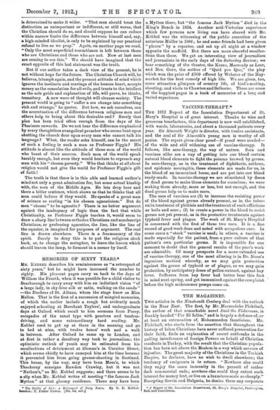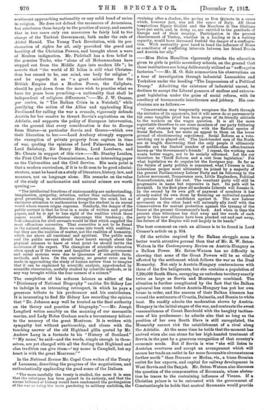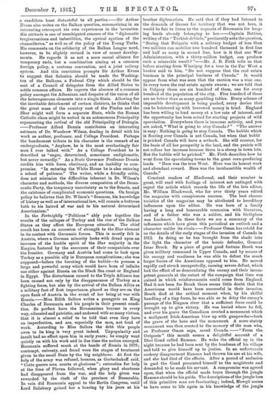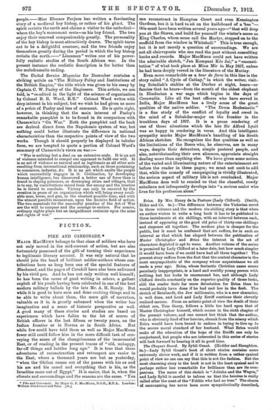THE MAGAZINES.
Two articles in the Nineteenth Century deal with the outlook in the Near East. The first, by Mr. Marmaduke Pickthall, the author of that remarkable novel Said the Fisherman, is frankly headed "For El Islien," and is largely a defence of, or at least an extenuation of, Mohammedan fanaticism. Mr. Pickthall, who starts from the assertion that throughout the history of Islam Christians have never suffered persecution for their faith, finds an explanation of recent outbreaks in the galling interference of foreign Powers on behalf of Christian residents in Turkey, with the result that the Christian popula- tion has been set above the Moslem in a way which savours of injustice. The great majority of the Christians in the Turkish Empire, he declares, have no wish to dwell elsewhere; the tendency of emigrants is to return. "Nowhere else could they enjoy the same immunity in the pursuit of rather dark commercial ends ; nowhere else could they extort such interest for money lent, or live on a luxurious scale so cheaply." Excepting Servia and Bulgaria, he denies them any corporate • A Report of the Inoculation Devartniast, Bt. Mary's Hospital, Paddington. Bale and Danielseon.
sentiment approaching nationality or any solid bond of union in religion. He does not defend the massacres of Armenians, but attributes them largely to the practioe of usury, and asserts that in two cases only can massacres be fairly laid to the charge of the Turkish Government, both under the rule of A bdul Hamid. The Young Turk Revolution, with its pro- clamation of rights for all, only provoked the greed and hostility of the Christian Powers, and brought about a wave of Moslem indignation. Mr. Pickthall has a firm belief in the genuine Turks, who "alone of all Mohammedans have stepped out from the Middle Ages into modern life "; he asserts that "the world of El Islam is still what Christen- dom has ceased to be, one mind, one body for religion " ; and be regards it as " a great misfortune for the British Empire that a Moslem Power, the Caliphate, should be put down from the mere wish to practise what we have for years been preaching—a nationality that shall be
independent of religious differences."—Mr. J. W. Ozanne, per contra, in "The Balkan Crisis in a Nutshell," while
justifying the action of the Allies and applauding King Ferdinand for calling the war a crusade, vigorously defends Austria for her resolve to thwart Servia's aspirations on the Adriatic, and supports the policy of European intervention, on the ground that every consideration is due to Europe from States—in particular Servia and Greece—which owe their liberation to her.—Lord Ayebury strongly supports the exemption of private property from capture in time of war, quoting the opinions of Lord Palmerston, the late Lord Salisbury, Sir Henry Maine, Lord Lorebarn, and Mr. Choate in support of this view.—Mr. Stanley Leathes, the First Civil Service Commissioner, has an interesting paper on the Universities and the Civil Service. His main point is that a modern curriculum, if it is to fit men to be good admini- strators, must be based on a study of literature, history,law, and manners, not on language alone. His remarks on the value of the study of mathematics and natural science are worth quoting :—
"The intellectual functions of statesmanship are understanding, imagination, sympathy, intuition, rather than ratiocination. A good grounding in mathematics strengthens the mind, but an exclusive attention to mathematics keeps the student in an unreal world where reason reigns supreme. Similarly, the danger of the public servant is that he lives in a realm of written and printed papers, and he is apt to lose sight of the realities which these papers record. Mathematics encourage this tendency; the best education for civil servants would be that which supplied the most efficacious corrective. That corrective is not to be found in the natural sciences. Here we come into touch with realities ; but they are the realities of matter, not the realities of humanity, which are above all emotional and spirituaL The public man and the public servant should have learnt enough about the physical sciences to know at what point he should invite the assistance of the expert. The champions of scientific education often speak as if the errors and inequities of public government and social systems were due to ignorance of scientific facts, methods, and laws. On the contrary, no greater error can be made in approaching the study of human nature than to imagine that it can be explained by scientific analysis, apprehended by scientific observation, usefully studied by scientific methods, or in any way brought within the four corners of a science."
The completion of his arduous labours as editor of the "Dictionary of National Biography" enables Sir Sidney Lee to indulge in an interesting retrospect, in which he pays a generous tribute to his predecessor and his contributors. It is interesting to find Sir Sidney Lee recording the opinion that "Dr. Johnson way well be treated as the final authority on the theory and practice of biography."—Mr. Joseph Longford writes sensibly on the manning of our mercantile marine, and Lady Helen Graham sends a tercentenary tribute to the memory of the great Montrose. It is written with sympathy but without partizanship, and closes with the touching answer of the old Highland gillie quoted by Mr. Andrew Lang in a footnote to his "History of Scotland." "My name,' he said—and the words, simple enough in them- selves, are yet charged with all the feeling that Highland and clan tradition can give them— my name is Campbell, but my heart is with the great Montrose."
In the National Review Mr. Capel Cure writes of the Treaty of Lausanne, describing the progress of the negotiations, and enthusiastically applauding the good sense of the Italians.
"The more carefully the treaty is studied, the more it is seen that the substance has been gained in its entirety, and that the serene tribunal of history would have condemned the prolongation of the war as being the mere pandering to military ambition, the straining after a shadow, the posing BA Don Quixote -in a cause which, however just, was not the cause of Italy. All these temptations Signor Giolitti and the Marchese di San Giuliano have put aside, and, in doing so, are entitled to the gratitude of Europe and of their country. Participation in the present chastisement of Turkey, whether in a leading or in a waiting capacity, would have increased tenfold the danger of a conflagra- tion. With neutrality goes hand in hand the influence of Rome as conciliator of conflicting interests between her friend Russia and Austria her ally."
Miss Helen Hamilton vigorously attacks the education given to girls in public secondary schools, on the ground that these institutions are being deliberately utilized as "suffragette factories."—Mr. M. 0. Sale summarizes his observations on a tour of investigation through industrial Lancashire and Yorkshire under the heading "The Impressions of a Political Tramp." Admitting the existence of industrial unrest, he declines to accept the Liberal panacea of endless and extrava- gant legislation under the guise of social reform, with its corollary of bureaucratic interference and jobbery. His con- clusions are as follows "Conservatism may temporarily recapture the North through the mistakes of its opponents, but it will never do so permanently till some tangible proof has been given of its friendly attitude to the workers on the wages question. It is all the more regrettable therefore to see some members of our party frittering away our chances by coquetting with the Radical species of Social Reform. Let me make an appeal to them on the lower ground of electioneering expediency. Social Reform as a vote- catching cry is played out. The hard-headed men of the North are at length discovering that the only people it ultimately benefits are the limited number of middle-class office-hunters known as 'the Government's friends.' I repeat, the working man wants better wages, not to be socially reformed. Let the cry therefore be 'Tariff Reform and a rest from legislation.' For what legislation we do require let the foreigner pay. So far as the future of party politics is concerned, what I foresee is this. Liberalism proper must ultimately be joined by a majority of the present Parliamentary Labour Party and its following in the Labour movement, Temperance men, Little Englanders, Political Nonconformists, and the rest. The resultant party will still be progressive in name but repressive in fact. Its path will be downhill. In the first place all moderate Liberals will forsake it. In the second by its own gift of payment of members it has already sealed its own doom by financing an unlimited number of genuine Labour candidates against it. The new Labour movement on the other hand will naturally ally itself with the Conservatives for mutual protection against the tyranny of the forces at the present Government's back. And when in time the present class bitterness has died away and the weeds of each party to this new alliance have been plucked out and cast away, the future of the Empire will rest largely in its hands."
The best comment on such an alliance is to be found in Lord Cromer's article on p. 954.
• Of the articles inspired by the Balkan struggle none is better worth attentive perusal than that of Mr. R. W. Beton- Watson in the Contemporary Review on Austria-Hungary as a Balkan Power. Mr. Seton-Watson has no difficulty in showing that none of the Great Powers will be so vitally affected by the settlement which follows the war as the Dual Monarchy. Not only is Austria-Hungary conterminous with three of the five belligerents, but she contains a population of 7,200,000 South Slays, occupying an unbroken territory exactly twice as large as Servia. and Montenegro combined. The situation is further complicated by the fact that the Balkan upheaval has come before Austria-Hungary has put her own house in order, and the success of their Balkan kinsmen has roused the sentiments of Croatia, Dalmatia, and Bosnia to white heat. He readily admits the moderation shown by Austria- Hungary in the initial stages of the war, and contrasts the sweet reasonableness of Count Berchtold with the haughty tactless- ness of his predecessor: he admits also that so long as the position of her own South Slays is still unregulated, the Monarchy cannot risk the establishment of a rival along the Adriatic. At the same time he holds that the moment has arrived when she can atone for her high-handed treatment of
Servia in the past by a generous recognition of that country's economic needs. But if Servia is wise "she will listen to Austrian overtures and accept an arrangement which will secure her trade an outlet in far more favourable circumstances further north" than Durazzo or Medna, viz., a trans-Bosnian outlet for her exports, and capital for railway development in West Servia and the Sanjak. Mr. Seton-Watson also discusses the question of the compensation of Roumania, whose absten-
tion he traces to the restraining influence of Vienna. If a Christian prince is to be entrusted with the government of Constantinople he holds that neutral Roumania would provide a candidate least distasteful to all parties.--Sir Arthur Evans also writes on the Balkan question, summarizing in an interesting retrospect his own experiences in the 'seventies. His attitude is one of unmitigated censure of the "diplomatic tergiversations and imbecilities, the cynical egotism of the chancelleries," as well as of the policy of the Young Turks. His comments on the solidarity of the Balkan League need, however, to be slightly revised in view of recent develop- ments. He regards it as not a mere casual alliance for temporary ends, but a combination aiming at a common foreign policy, a customs convention, and a joint railway system. And this conviction prompts Sir Arthur Evans to suggest that Salonica should be made the Washing- ton of the Balkans, a Federal City which should be the seat of a Council of delegates from the Allied States to settle common affairs. He regrets the absence of a common policy amongst the Albanians, and despairs of the union of all the heterogeneous elements into a single State. Allowing for the inevitable detachment of certain districts, he thinks that the great mass of the country east of the Pindus and the Shar might well form a separate State, while the Roman Catholic clans might be united in an autonomous Principality representing the revival of the old Principality of Dukagin. —Professor Alfred Dennis contributes an interesting estimate of Dr. Woodrow Wilson, dealing in detail with his work as author, professor, and College President. Perhaps the handsomest tribute to his character is the remark of an undergraduate, "Anyhow, he is the most everlastingly fair man I ever talked with." As a College President he is described as "eager, determined, sometimes undiplomatic, but never cowardly." As a State Governor Professor Dennis credits him with force, obstinacy, and an inability to com- promise. "In entering the White House he is also entering a school of patience." The writer, while a friendly critic, does not minimize the difficulties inherent in Dr. Wilson's character and methods, the diverse composition of the Demo- cratic Party, the temporary uncertainty as to the Senate, and the existence of complicated economic questions. On foreign policy he believes that Dr. Wilson's "firmness, his knowledge of history as well as of international law, will remain a buttress both to his hatred of war and to his natural determined Americanism."
In the Fortnightly "Politicus " ably puts together the results of the collapse of Turkey and the rise of the Balkan States as they affect the European situation. The chief result has been an accession of strength to the Slav element in its contest with Germanic forces. This is mostly felt in Austria, where a. German minority looks with dread upon an increase of the hostile spirit of the Slav majority in the Empire, fostered by the successes of their compatriots over the frontier. Germany and Austria had come to look upon Turkey as a possible ally in European complications ; she was supposed—before the bursting of the bubble—to possess a large and powerful army which would have been of infinite use either against Russia on the Black Sea coast or England in Egypt The disturbance caused to the Triple Alliance has been caused not only by the disappearance of Turkey as a fighting force, but also by the arrival of the Balkan Allies as a military fact of first importance, placed as they are on the open flank of Austria in the event of her being at war with Russia.—Miss Edith Sellers writes a panegyric on King Charles of Roumania and his people in their present condi- tion. So perfect have the Roumanians become in every way, educated and patriotic, and endowed with so many virtues, that it is almost a relief to be told that even they have an imperfection, and are, especially the men, not fond of work. According to Miss Sellers the debt this people owes to its king is very great indeed. Unpopularity and insult had no effect upon him in early years; he simply went quietly on with his work and in due time the nation emerged. Roumania suffered much at the hands of Russia in 1878; contempt, entreaty, and fraud were the stages of treatment given to the small State by the big neighbour. At first the help of the army was refused, because, as Gortschakoff said, " Cette guerre sera courte et glorieuse "; entreaties for help at the time of Plevna followed, when glory and shortness had disappeared from the war, and the help given was rewarded by the theft of the province of Bessarabia. In vain did Roumania appeal to the Berlin Congress, until Lord Salisbury gained her a hearing by his jeers at his
brother diplomatists. He said that if they had listened to the demands of Greece for territory that was not hers, it would be fair to listen to the requests of Roumania for keep- ing lands already belonging to her.—Captain Battine, writing of the "Turkish debacle," pertinently asks the question, "Seeing that Bulgaria with a military budget of less than two millions can mobilise two hundred thousand in first line and half as many in second line, how is it that our War Administration, with a thirty-million budget, can produce such a miserable result P "--Mr. J. B. Firth tells us that before starting from Winnipeg for a tour in the Far West a banker said to him, "Do not suppose that the real estate business is the principal business of Canada." It would appear from what was seen that the caution was a wise one. In every town the real estate agents swarm ; we are told that in Calgary there are six hundred of them, one for every hundred of the population of the city. Five hundred of these are no better than as many gambling tables. Every scheme of impossible development is being pushed, every device that can be bolstered up with borrowed money is tried. England has been willing to lend money at a low rate of interest, and the opportunity has been seized for starting projects of wild speculation. Everywhere there is immense activity, and you are asked, " What is going to stop Canada P" "The answer is easy : Nothing is going to stop Canada. The bubble which is floating over Canada is not Canada, but when that bubbl is pricked Canada will have a setback. She will recover, for the basis of all her prosperity is the land, and the prairie will not refuse her increase because there is a slump in town lots. But the bubble will be pricked." Mr. Firth describes how he went from the speculating towns to the great corn-producing lands. "Here was the true West. Here was its honest work and abundant reward. Here was the inexhaustible wealth of Canada."
Constant readers of Blackwood, and their number is great, will read with feelings of interest not untinged with regret the article which records the life of the late editor, Mr. William Blackwood, who for over thirty years edited the magazine with conspicuous success. The best charac- teristics of the magazine may be attributed to hereditary influences upon the editor. He was born of a family having a long and honourable connexion with literature, and of a father who was a soldier, and his birthplace was Lucknow. In these facts we see a summary of the influences which have given this periodical an outlook and a character unlike its rivals.—Professor Oman has retold for us the details of the early stages of the invasion of Canada in 1812. In doing so he has brought from the shade into the light the character of the heroic defender, General Isaacs Brock. By a piece of great good fortune Brock was given military command in Upper Canada, and by means of his energy and readiness he was able to defeat the much larger forces of the Americans opposed to him. He moved rapidly and struck unexpectedly, causing severe defeat, which bad the effect of so demoralizing the enemy and their incom- petent generals at the outset of the campaign that time was gained in which reinforcements could come from England. Had it not been for Brock there seems little doubt that the Americans would have been successful in their invasion. Brock died at the critical moment when, by his skilful handling of a tiny force, he was able so to delay the enemy's passage of the Niagara river that a sufficient force could be brought up to give victory. He was buried where he fell, and over his grave the Canadians erected a monument which a. malignant Irish-American blew up with gunpowder—both the grave of the hero and the monument A more stately monument was then erected to the memory of the man who, as Professor Oman says, saved Canada. —"From the Outposts" this month comes a delightful account of a Bhoi Gond called Rammu. He woke the official up in the night because he had been sent by the headman of his village and told to give himself up to justice. In an unfortunate cookery disagreement Rammu had thrown his axe at his wife, and she had died of the effects. After a period of seclusion in gaol the Gond presented himself to the magistrate and demanded to be made his servant. A. compromise was agreed upon, that when the official made tours through the jungle Rammn should be his guide. The descriptions of the jungle lore of this primitive man are fascinating ; indeed, Mowgli seems to have come to life again in his knowledge of the jungle
people.—Miss Eleanor Farjeon has written a fascinating story of a medieval boy bishop, or rather of his gho3t. The spirit revisits the earth and claims a visitor to the cathedral—
where the boy's monument rests—as his boy friend. The two enjoy their renewed companionship greatly. The personality of the boy bishop is most attractively drawn. The spirit turns out to be a delightful creature, and the two friends enjoy themselves greatly during the period in which the boy bishop revisits the earth.—" Linesman" writes one of his power- fully realistic studies of the South African war. In the present instance the realistic description is far better than the melodramatic ending.
The United Service Magazine for December contains a striking article on "The Military Policy and Institutions of the British Empire," the title which was given to his essay by Captain C. W. Pasley of the Engineers. This article, we are told, is "re-edited in the light of the science of organization by Colonel B. R. Ward, R.E." Colonel Ward writes with deep interest in his subject, but we wish he had given us more of a precis of Pasley and less of comment. He is quite right, however, in thinking that the main interest of Pasley's remarkable pamphlet is to be found in its comparison with Clausewitz's "On War." Both the pamphlet and the book are derived direct from the Napoleonic system of war, but nothing could better illustrate the difference in national characteristics than the respective points of view of the two works. Though it should properly be displayed in tabular form, we are tempted to quote a portion of Colonel Ward's summary of Clausewitz's views on war:—
" War is nothing but a duel on an extensive scale. It is an act of violence intended to compel our opponent to fulfil our will. It is an act of violence as natural and as legitimate as all other acts resulting from international relationship, such as those pertaining to commerce, industry, ex. It is an act which exalts the people which successfully engages in it. Civilization, by developing human intelligence, has discovered a better use of force than is found in slaying prisoners, or destroying cities and villages, that is to say, by contributions raised from the enemy and the treaties he is forced to conclude. Victory can only be ensured by the creation in peace of an organization which will bring every avail- able man, horse, and gun, in the shortest possible time, and with the utmost possible momentum, upon the decisive field of action. The two essentials for the successful practice of the Art of War are the will to conquer and the courage to endure. For armies, ordinary rights place but an insignificant restraint upon the aims and rights of wax."









































































 Previous page
Previous page